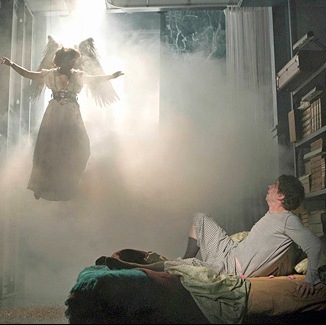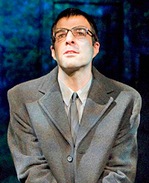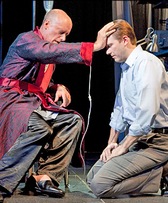SITE GUIDE
SEARCH
REVIEWS
REVIEW ARCHIVES
ADVERTISING AT CURTAINUP
FEATURES
NEWS
Etcetera and
Short Term Listings
LISTINGS
Broadway
Off-Broadway
NYC Restaurants
BOOKS and CDs
OTHER PLACES
Berkshires
London
California
New Jersey
DC
Connecticut
Philadelphia
Elsewhere
QUOTES
TKTS
PLAYWRIGHTS' ALBUMS
LETTERS TO EDITOR
FILM
LINKS
MISCELLANEOUS
Free Updates
Masthead
A CurtainUp Review
Angels in America: A Gay Fantasia on National Themes
Part 1: Millenium Approaches - Part 2: Perestroika
Part 1: Millenium Approaches - Part 2: Perestroika
By Elyse Sommer
|
It's scarily timely, in some ways that I wish it wasn't: the 'eco-cide' of global warming, the rise of the reactionary right in response to Obama's election, and the suicides and beatings of young gay men. And the spookiest thing of all, has to do with AIDS. When the play was written there were 7 million people with the disease. There are now 33 million. We've gone from the terrible silence about AIDS described in the play to AIDS being in the news all the time, to it virtually becoming invisible once again. — Tony Kushner commenting on whether Angels in America in an interview for The Los Angeles Times by Patrick Pacheco. The great work begins— The Angel in Part 1, Prior in Part 2 |

Robin Weigert as the Angel and Christian Borle as Prior Walter
(Photo: Joan Marcus)
|
| Five of the leading actors must depart 1/30/11 due to prior commitments: Christian Borle and Zachary Quinto; the incredibly versatile Robin Bartlett, Zoe Kazan and the Angel of the title. But the show will go on for another five weeks. Starting Feb. 2nd , Adam Driver (most recently in Mrs. Warren's Profession) will play the role of Louis Ironson, Lynne McColloughwill play the role of Hannah Pitt and Michael Urie (of Ugly Betty, The Temperamentals) will play the role of Prior Walter, plus additional cast replacements. Tickets as of the extension dates will be $85 which should make them more easily available and also provide a nice cushion for the company's bottom line. |
Since its debut almost two decades ago, Tony Kushner's Angels in America has held its place as one of the great plays in the contemporary theatrical canon. This extraordinary and audacious act of imagination is populated by an array of unforgettable characters, both fictional and real,. Their stories fill a giant canvas with provocative themes. Grandiose but gratifyingly on the mark in its ambition, it really delivers on that rather showy A Gay Fantasia on National Themes. The writing is lyrical and witty, evoking laughter (sometimes hilariously so) despite the pain and feverish delusions on display.
Hats off to the Signature Theatre Company for launching its Tony Kushner season with a magnificent new production which, under Michael Greif's direction, fully realizes the play's epic and enduring theatricality, vividly and fluently segueing between reality and magic realism — and with actors who once again make the stage pulse with Kushner's passionate monologues and conversations that are filled with sadness as well as the brilliant dark humor.

Zachary Quinto as Louis
(Photo: Joan Marcus ) |
Each part still begins with a philosophic prologue —the rabbi conducting the burial of Louis's grandmother in Part 1 and the World's oldest living Bolshevik ushering in a new age of hope. The Angel's "Let the Great Work Begin" that ends Part 1, leads to a changed interpretation by the AIDS stricken Prior Walter at the end of Part2.
The more or less straighforward plot still revolves around two couples: 1. A gay couple, Prior Walters and Louis Ironson, whose 5-year relationship ends due to Louis's inability to be part of the pain of Prior's HIV infection. 2. Harper and Joe Pitt, two New York immigrants from Salt Lake City whose Mormon faith exacerbates rather than helps them deal with his deeply closeted homosexuality. She deals with his rejection with an over reliance on valium induced fantasies, some of which are brilliantly acted out; for examplem when her delusion transforms the stage into Antartica as a metaphoric safe haven for her numbed feelings.
Colliding and interacting with these couples there's another AIDS victim, the Mephistophelean lawyer Roy Cohn. As Prior is haunted by the mysterious Angel, so Cohn has a bedside ghost in Ethel Rosenberg. The character serving as a connecting thread and who's also the most grounded and likeable, is Belize, a nurse who used to be a drag queen and Prior's lover and who, unlike Louis, stands by him. He also happens to be assigned to the despicable Cohn's hospital room.

Frank Wood as Roy Cohn and Bill Heck as Joe Pitt
(Photo: Joan Marcus )
|
Naturally, spending from two to five PM and an evening lasting until well past eleven in the theater is as exhausting as it is exhilarating. The three hours of Millenium actually passed as if propelled by angel wings. But, since "revised" for Tony Kushner has no relation to "trimmed", the last 40 minutes of Perestroika's 3 hours and 40 minutes did prompt a wish that some of the Roy Cohn hospital business and the scene with the Angelic Entities who are peers to the titular Angel had been put on a bit of a verbal diet. But I'm being curmudgeonly in view of the overall achievement: a play that is a great human drama that is as entertaining and comic as it is cathartic and that's currently freshened and enriched by Kushner's revisions and performances that are star caliber even though none of the actors are superstars with instant name recognition.
Zachary Quinto, the only movie star in this ensemble (he played the young Spock in the 2007 reboot of the famous Star Trek film franchise) is also the only one without a string of stage credits on his resume. Yet he gets the difficult role of Louis, Prior's liberal politics spouting lily livered lover, just right. So much so that you can't really hate him even though he's the play's secondary villain who doesn't really deserve the redemptition he seeks.
While I thought no one could ever be as moving a Prior as Stephen Spinella, Christian Borle proves otherwise. He is profoundly moving as he journeys from being being terror stricken and angry to strong and determined survivor.
Frank Wood, usually seen in more understated roles, is a marvelously and maniacally awful Roy Cohn. With his rat-a-tat speech and contorted mount he actually looks and sound like the real Cohn.
Bill Heck, who appeared as the one single role character in last season's marathon event at this theater, Horton Foote's The Orphan's Home Cycle, once again impresses as the Republican Mormon lawyer who finally allows himself to give in to his homosexuality. Zoe Kazan adds to a growing roster of critically applauded performances as Harper, Joe's emotionally fragile, frustrated wife who seeks solace from valium pills and a fantasy life and finally gains the strength to leave her empty marriage.
Another terrific performance is delivered by Billy Porter as Belize; ditto for Robin Weigert as the more scary than comforting Angel who tries to turn Prior into a prophet. Yhere's a good deal of doubling by the entire ensemble (the funniest being Heck and Wood as ghostly 13th and 17th century Prior Walters making ghostly appearances in one of the ill Prior's hallucinatory dreams and Belize as Mr. Lies, Harper's imaginary travel agent friend). Niy honors for taking on the most roles go to Robin Bartlett. Her main roles are those of Joe's uptight but ultimately quite likeable, mother and the Úghost of Ethel Rosenberg. She's also terrific in the two prologues, first as a rabbi and and then as an ancient Bolshevik and the doctor who diagnoses Cohn's AIDS and is met with one of the most bizarrely funny statement of denial you're ever likely to hear.
I can't overstate the visual pleasures of this production and in this space where every seat is a best of the house seat. Greif and scenic designer Mark Wendland take us to the diverse earthbound and heavenly locales with unfussy elegance. The at times overlapping action is particularly spell binding during a highly emotional scene between each of the two key couples that's played out simultaneous. Michael Friedman's original music, and Ben Stanton's lighting design and Wendall K. Harrington's projections are additional enhancements.
I could go on singing the praises of Mr. Kushner's intricate human tapestry. While Angels in America will always be associated with the disheartening aspects of the Reagan era and the burgeoning AIDS crisis, it is a morality tale without a closing date. It's relevant as ever because the disturbing lowering of the moral compass didn't end in the years that followed. The rich and the powerful like Roy Cohn still get the best health care and drugs unavailable to the less privileged, and, as the author pointed out in a recent interview (see the quote at the top of this review), the current AIDS statistics point to yet another disheartening chapter in that plague's history. And yet, Angels in America' is an uplifting play, and its concluding part more comedy than tragedy. Though Part 1 begins with a funeral, Part 2 concludes on a more hopeful note with the main characters gathered at Central Park's lovely Bethesda Fountain and changed for the better. That includes Prior, who has been to heaven and back. He wishes us "More Life " and assures us that "The Great Work Begins".
When this already twice extended run ends, the season continues. In addition to the New York premiere of The Intelligent Homosexual's Guide to Capitalism and Socialism With a Key to the Scriptures also directed by Michael Greif there'll be a production of The Illusion Kushner's freely adapted version of Pierre Corneille's L'Illusion Comique, directed by Michael Mayer.
|
Angels in America: Part I A Gay Fantasia on National Themes - Part 1: Millenium Approaches - Part 2, Perestroika Playwright: Tony Kushner Director: Michael Greif Cast: Robin Bartlett (Hannah Pitt), Christian Borle(Prior Walter), Bill Heck (Joe Pitt), Zoe Kazan (Harper Pitt), Billy Porter ( Belize), Zachary Quinto (Louis Ironson), Robin Weigert (The Angel), Frank Wood (Roy Cohn) Note: The program lists only the main roles though there is a good deal of double role playing, especially by played by Robin Bartlett Scenic design: Mark Wendland Costume design: Clint Ramos Lighting design: Ben Stanton Sound design: Ken Travis Projection design: Wendall K. Harrington Music: Michael Friedman Hair and wig design: by Charles G. Lapointe Dialect coaching: Deborah Hecht Fight direction: Rick Sordelet. Production Stage Manager: Monica Cuoco Running Time: Part 1 is 3 hours; Part 2 is 3 hours and 40 minutes, both with 2 intermissions Signature Theatre Company Peter Norton Space 565 W. 42nd Street. From 9/14/10; opening 10/28/10; closing 2/20/11 Both parts 1 and 2 reviewed by Elyse Sommer at Sunday October 23rd press previews |
|
REVIEW FEEDBACK Highlight one of the responses below and click "copy" or"CTRL+C"
Paste the highlighted text into the subject line (CTRL+ V): Feel free to add detailed comments in the body of the email. . .also the names and emails of any friends to whom you'd like us to forward a copy of this review. Visit Curtainup's Blog Annex For a feed to reviews and features as they are posted add http://curtainupnewlinks.blogspot.com to your reader Curtainup at Facebook . . . Curtainup at Twitter Subscribe to our FREE email updates: E-mail: esommer@curtainup.comesommer@curtainup.com put SUBSCRIBE CURTAINUP EMAIL UPDATE in the subject line and your full name and email address in the body of the message. If you can spare a minute, tell us how you came to CurtainUp and from what part of the country. |



